Have you ever caught your dog staring intently at you, tongue darting out to lick its lips? This common dog behaviour has several possible motivations behind it. Lip licking in dogs can signify stress, nervousness, or excitement. It can also simply be a way for a dog to self-soothe, stimulate saliva production, or groom its mouth area.
By learning why dogs lick their lips in different scenarios, you can better understand your pets. This article explores the common reasons behind dogs licking their lips and when to be concerned about excessive lip licking. Read on for insights into this intriguing dog behaviour.
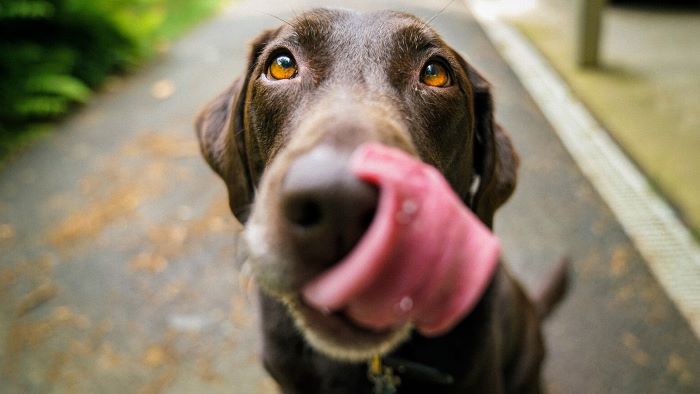
Natural Dog Behaviour
A degree of lip licking in dogs is normal and is considered “displacement behaviour”. These are behaviours dogs display in situations where more obvious actions like fight or flight aren’t viable. Lip licking allows dogs to relieve stress and self-soothe. Understanding some common scenarios where lip licking arises provides context on your dog’s state of mind.
Lip Licking as a Calming Signal
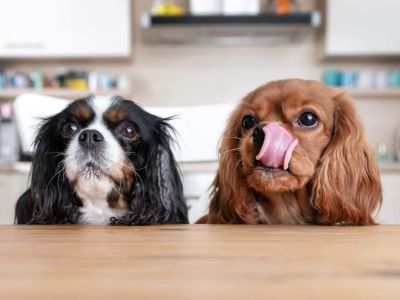
Dogs display certain calming signals to show they are not a threat. Lip licking is thought to mimic what pups do when nursing to their mother to stimulate milk flow. By licking their lips, dogs communicate peaceful intentions. You may see lip licking when greeting a new dog or a person. It signals: “I’m not dangerous.”
Self-Grooming Habit
Much like cats groom themselves by licking, dogs may lick their lips to clean their mouth area. Their tongue helps distribute oils around their lips and stimulates saliva. A bit of lip licking after eating or drinking helps keep the muzzle tidy. It can become an ingrained habit like humans biting their nails.
Sign of Submission
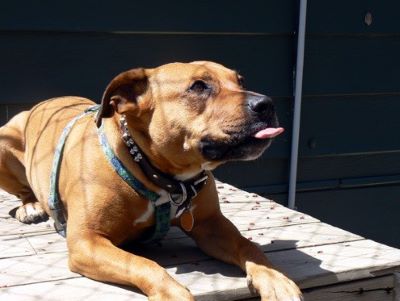
Exposing the teeth is seen as aggressive in the dog world. Lip licking retracts the lips, averting a toothy snarl. Dogs may lick their lips when confronted by a more dominant dog or person. Combined with avoiding eye contact and crouching posture, it communicates submission.
Communication of Non-Threat
Lip licking signals peaceful intentions. Dogs use it to diffuse tense situations and say “I’m not a threat”. For example, a dog may lick its lips when a larger, unfamiliar dog approaches on a walk. It defuses tension and communicates there’s no need for an altercation.
Stress or Anxiety
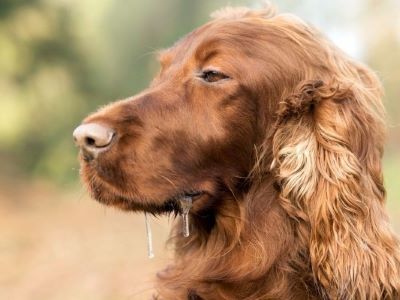
Perhaps the most common reason dogs lick their lips is nervousness or stress. If your dog seems anxious, look for lip licking along with yawning, shaking off, or whale eye. It acts as a calming mechanism dogs use when they can’t physically escape a situation causing fear or anxiety.[1]
Nervousness
New places, people, dogs or situations can make a dog nervous. Lip licking helps relieve nervous energy and tension. You may see it during visits to the vet, or groomer, or when guests arrive at home. It signals: “I’m stressed but won’t cause trouble.”
Fear
Dogs lick their lips when afraid much lick people bite their nails. Quick lip licking can indicate a dog is fearful of something in its environment like loud noises. Sustained, exaggerated lip licking can signify intense fear, like during thunderstorms or fireworks.
Discomfort or Pain
Dogs unable to flee discomfort lick their lips to self-soothe. This includes anxiety over confinement in a crate or carrier. Dogs also lip lick to cope with physical discomfort or pain. For example, a dog with arthritis may lick its lips when standing up.
Anticipation and Excitement
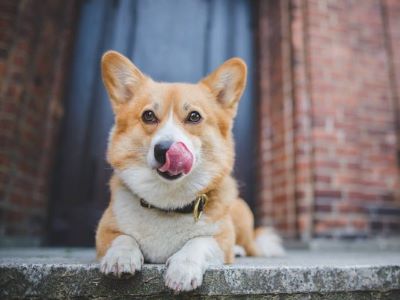
Not all lip-licking stems from anxiety. Dogs also lick their lips in happy anticipation. It helps channel excited energy when they have to wait for something they want. Think of it like kids bouncing in their seats. Scenarios where you may see anticipatory lip licking include:
Expecting Food
It’s common for dogs to lick their lips before meals or treats. This helps stimulate saliva in preparation for eating. Some dogs will stare intently and lick their lips when they know dinner is coming soon. It shows food-motivated excitement.
Eager for Attention or Play
Much like humans grin when excited, dogs lick their lips. Your dog may lick in anticipation when you grab a tennis ball to initiate playtime. Or when you return home, it may lick with excitement for your attention. Lip licking reflects the dog’s eagerness and joy.
Scenting Interesting Smells
Dogs use lip licking to improve their ability to taste and smell stimuli. Your dog may lick its lips when catching an intriguing scent on a walk. By spreading saliva, it helps scent particles stick for improved smell and taste. The lip-licking response shows interest.
Medical Causes
While most lip licking can be explained by behaviour, excessive or unusual lip licking could signal an underlying medical issue. Contact your veterinarian if your dog displays persistent lip licking combined with other signs of illness. Possible medical causes include:
Allergies: Dogs with skin or food allergies may compulsively lick their lips. Allergy symptoms like itchy skin, ear infections, and nausea cause discomfort. Excessive lip licking helps distract and soothe allergic reactions. Consider allergy testing with your vet. Dental Problems: Irritation from a cracked tooth, dental infections, or mouth sores can lead to repeated lip licking. It may be an attempt to clear out the mouth or relieve pain. Schedule a veterinary dental exam if your dog is displaying dental discomfort. Nausea: Motion Sickess, intestinal parasites, and other forms of nausea make dogs lip lick. Much like people nauseated lick their lips, dogs do too. Along with lip smacking, look for vomiting, lethargy or diarrhea. Seek vet care to determine the cause of stomach upset. Neurological Disorders: Seizure activity and neurological issues like distemper can induce lip smacking motions. Examine whether your dog's lip licking accompanies head twitching, behaviour changes, or impaired movement. Consult your vet to check for underlying neurological conditions.
Managing Excessive Lip Licking
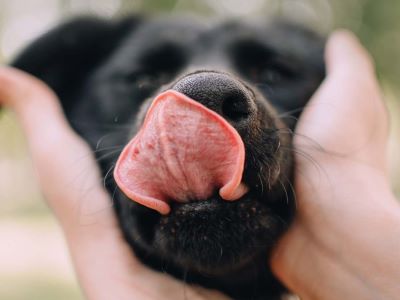
If your dog’s lip-licking becomes compulsive or distracts from normal behaviour, try these management tips:
Address Underlying Stressors
If anxiety is the root of excessive licking, address what’s causing your dog stress. Limit exposure to loud noises, unfamiliar places or animals your dog fears. Create a predictable routine and safe spaces at home. Consult a trainer or veterinary behaviourist for customized desensitization programs. Teaching your dog coping mechanisms for stress can reduce anxious lip licking.
Redirect with Commands
If your dog starts compulsively licking its lips, redirect the behaviour. Use commands like “sit” or “shake” followed by praise and treats. Ask for obedience cues or engage in a short training session to interrupt the lip-licking cycle. With consistency, you can break the obsessive habit.
Provide Enrichment
Increase daily exercise and mental stimulation. Make sure your dog gets plenty of playtime, walks, cuddle sessions and food puzzles. Keeping your dog’s mind and body active reduces boredom and channels energy away from obsessive lip licking. A tired dog is less likely to fixate through anxious behaviours.
FAQs
Why does my dog lick its lips when I’m eating?
Dogs naturally lick their lips in anticipation of food. When you’re eating, your dog likely licks in hopes of getting a tasty morsel. It’s a sign of excitement and eagerness. Just be sure to refrain from feeding table scraps to avoid reinforcing the behaviour.
Why does my dog lick the air?
Air licking is connected to lip licking and serves a similar soothing purpose. It may help stimulate scent and taste receptors. Dogs essentially lick the air to self-calm or take in interesting smells more efficiently. It’s normal dog behaviour unless excessive.
Why does my dog lick everything?
Some dogs display repetitive, obsessive licking behaviours on objects, furniture or even their limbs. This signals anxiety, stress or a compulsive disorder. Check with your veterinarian to rule out medical causes. In behavioural cases, try more exercise mental stimulation and training to reduce anxious lip licking.
Why does my dog lick faces?
Face licking in dogs is a social grooming behaviour. It likely stems from pups licking around their mother’s mouth to get her to regurgitate food. Dogs now do it to show affection and greet trusted humans. However, not everyone appreciates doggie kisses, so try to redirect the behaviour if unwanted.
When should I worry about excessive lip licking?
Contact your vet if your dog’s lip-licking seems compulsive or excessive or is paired with other symptoms like lethargy, nausea or neurological issues. Persistent lip-smacking with no clear behavioural cause could mean an underlying health problem and require treatment. It’s better to be safe than sorry with significant changes.
Conclusion
Lip licking is a common dog behaviour with a wide range of motivations behind it. Light, occasional lip licking is completely normal and helps dogs communicate and self-soothe. However, excessive or out-of-context lip licking could indicate underlying issues with your dog’s health or emotional state that require attention.
By learning your individual dog’s lip-licking patterns and triggers, you can better understand the meaning behind this intriguing behaviour. With time and observation, you’ll gain insights into what your dog is trying to say when its tongue darts out for a lick. Just be sure to consult your veterinarian if you have concerns about persistent lip smacking. With the right approach, you can keep your dog happy, healthy and licking its lips within normal ranges.
Reference:
- Why Do Dogs Lick Everything? | petMD



